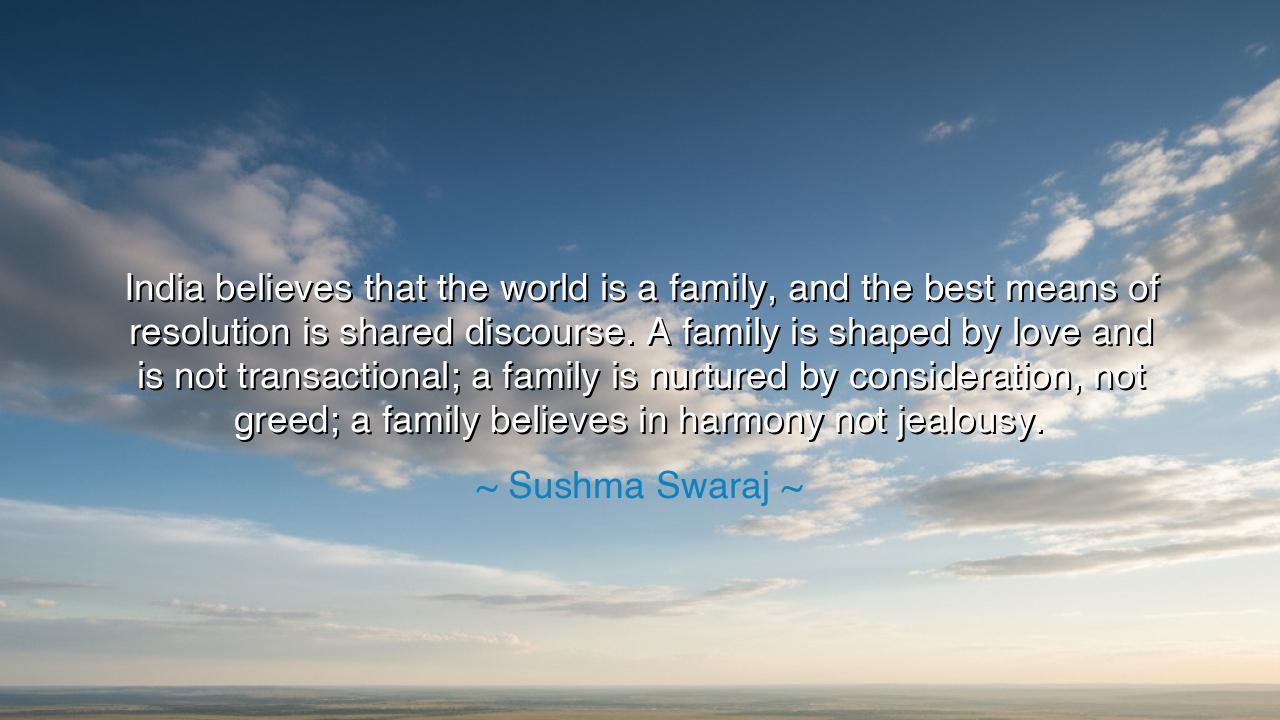
India believes that the world is a family, and the best means of
India believes that the world is a family, and the best means of resolution is shared discourse. A family is shaped by love and is not transactional; a family is nurtured by consideration, not greed; a family believes in harmony not jealousy.






In the noble and soul-stirring words of Sushma Swaraj, “India believes that the world is a family, and the best means of resolution is shared discourse. A family is shaped by love and is not transactional; a family is nurtured by consideration, not greed; a family believes in harmony not jealousy.” These words carry the fragrance of ancient wisdom — a truth rooted deep in the spiritual soil of Bharat, yet universal in its reach. They echo the timeless Indian ideal of Vasudhaiva Kutumbakam, meaning “the world is one family.” Through this vision, Swaraj reminds us that diplomacy, politics, and even personal life can rise above self-interest when guided by love, respect, and shared understanding.
The origin of this quote lies in Swaraj’s address as India’s Minister of External Affairs, where she often spoke with the grace of a sage and the conviction of a warrior. In her words, the pulse of Indian civilization beats — a civilization that has never sought conquest through power, but through compassion. When she spoke of the world as a family, she was not offering rhetoric, but reviving an ancient vision first sung by the seers of the Upanishads. For thousands of years, India’s philosophy has proclaimed that true strength lies not in domination, but in harmony — not in jealousy or greed, but in mutual care. In Swaraj’s voice, this wisdom found new life, reminding modern humanity of its forgotten kinship.
A family, as she described, is not transactional. It does not measure its members by profit or advantage. It thrives on love, on the silent give-and-take of understanding, and on the shared warmth of belonging. In the same way, she envisioned nations as parts of a single family — bound not by trade or treaty alone, but by the deeper bond of humanity. Her words challenge the cold calculations of the modern world, where diplomacy too often serves only wealth and power. She called instead for shared discourse, for dialogue rooted in empathy rather than ambition. For what is discourse, if not the meeting of hearts before the clash of interests?
History offers us many proofs of this truth. Consider the example of Mahatma Gandhi, who turned to non-violence not as weakness, but as strength. When the world was torn by wars of greed and empire, Gandhi stood as a voice of moral clarity, proclaiming that love and understanding were stronger than bullets and envy. Through ahimsa (non-violence) and satyagraha (truth-force), he showed that real change comes not through hatred but through shared discourse, just as Sushma Swaraj later envisioned on the global stage. His methods inspired not only India’s freedom but also movements for justice across continents — proof that a heart guided by compassion can lead humanity further than the sword ever could.
The idea of family that Swaraj evokes is not limited to human society alone; it extends to the Earth itself. In Indian thought, rivers are mothers, mountains are fathers, and all creatures are kin. When she spoke of nurturing the world through consideration, she was also reminding us of our duty to nature — to protect, not exploit; to preserve, not plunder. For greed, she warned, is the destroyer of harmony. Just as a family falls apart when selfishness prevails, so too will the world crumble if nations place wealth above welfare. In her words lives a warning: that civilization cannot survive without consideration, that prosperity without compassion is but decay in disguise.
Yet Swaraj’s wisdom also celebrates hope — the harmony that arises when understanding replaces jealousy. Jealousy, whether between individuals or nations, breeds conflict and division. It blinds the heart to the truth that another’s gain need not be one’s loss. A family thrives because it rejoices in each other’s joys and shares in each other’s sorrows. Likewise, the world can prosper only when it learns to delight in collective success rather than coveting power or territory. This is the heart of Swaraj’s teaching — that harmony is not the absence of struggle, but the triumph of unity over envy.
The lesson, dear listener, is as old as it is profound: to see the world not as strangers in competition, but as kin bound by destiny. Let your words be guided by understanding, not anger. Let your relationships — with your family, your community, and your nation — be shaped by love, not by transaction. If conflict arises, do not reach first for judgment, but for shared discourse. Listen as much as you speak. Seek not to win, but to connect. For in the art of listening, peace is born; in the spirit of compassion, the world becomes one home.
So let the voice of Sushma Swaraj echo across the ages, as both prayer and instruction: “The world is a family.” Let us build this family with love as its foundation, consideration as its nourishment, and harmony as its song. The world is weary of greed and rivalry; it yearns for the tenderness of kinship. The one who understands this truth — who treats the stranger as a brother, the rival as a fellow traveler, the Earth as a mother — becomes not only wise but immortal in spirit. For those who live by love do not merely exist in the world; they help the world itself to endure.






AAdministratorAdministrator
Welcome, honored guests. Please leave a comment, we will respond soon